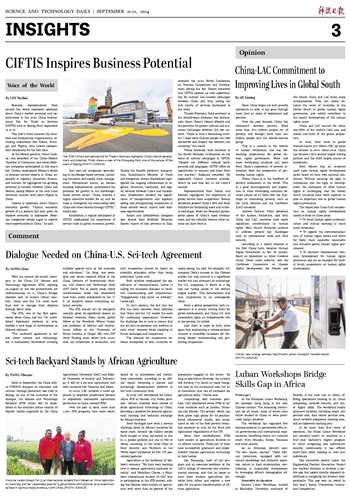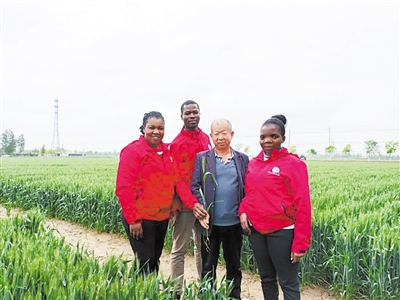
 |
| Francina Lerato Kuwali (1st L), an international student from Malawi at China Agricultural University, and her classmates pose for a group photo with a farmer at an experimental field in Quzhou, Hebei province, north China. (PHOTO: XINHUA) |
Early in September, the China-Africa-UNESCO dialogue on education and cultural heritage protection was held in Beijing. As one of the outcomes of the dialogue, the Science and Technology Backyard (STB) center will be established in the southern Africa country of Malawi. Jointly organized by the China Agricultural University (CAU) and Malawi University of Science and Technology, it will be a sci-tech agricultural hub with countries like Tanzania and Kenya.
In 2009, CAU initiated a novel approach to empower smallholder farmers to implement sustainable agricultural production in China, namely STBs.
Over the past 15 years, more than 1,200 STB programs have been established by 74 universities and institutions nationwide, according to an official report, becoming a science and technology dissemination platform at the local community level.
In 2019, CAU established the China-Africa STB in Handan city, Hebei province. African students were invited to study agricultural technology in China, providing a platform for practical agricultural learning and technical exchange for African students.
Food shortages have been a serious challenge faced by African countries for many years. Around 733 million people faced hunger in 2023, equivalent to one in 11 people globally and one in five in Africa, according to the latest State of Food Security and Nutrition in the World report published by five UN specialized agencies.
Agriculture is the backbone of Malawi's economy. "We have been learning how to operate agricultural machines recently," said Madalitso Chirwa, a Malawian international student of CAU who is participating in the STB project, adding that Malawi relies mainly on agriculture, with more than 80 percent of the population engaged in the sector. "As long as agriculture develops, the country will develop. I've learnt so many things, not only on the mechanical side, but also theoretical, that has all increased my agricultural skills," Chirwa said.
Cooperating with domestic partners, CAU established seven STBs in African countries such as Zambia, Tanzania and Malawi. The project, which has been given high praise for its practice-based educational model, was recognized as one of the best poverty reduction practices in 2021 by the Food and Agriculture Organization of the UN.
Since their establishment, STBs have trained 91 agricultural students in 12 African countries. Thirty-six of them have successfully graduated and implemented Chinese agricultural technology in their homes.
Jiao Xiaoqiang, head of the program and an associate professor at the CAU's college of resources and environmental sciences, said that he hopes to train more modern agricultural students from Africa and explore a new path for the green transformation of African agriculture.


 Next
Next




